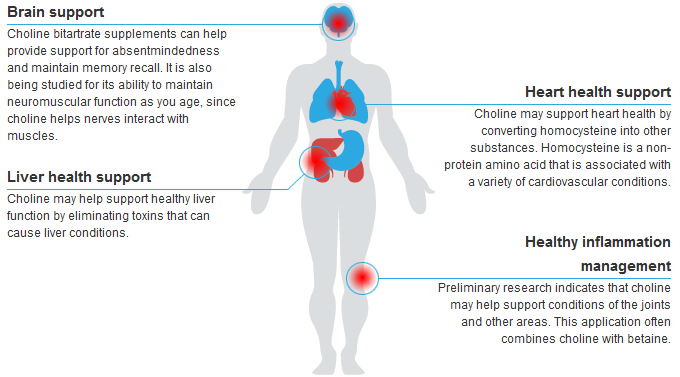 Choline bitartrate is choline combined with a salt of tartaric acid. It has a much better absorption rate than pure choline, which is an essential human nutrient. Choline is chemically related to the B group of vitamins, although the Food and Nutrition Board of the Institute of Medicine in the United States did not classify choline as an essential nutrient until 1998.
Choline bitartrate is choline combined with a salt of tartaric acid. It has a much better absorption rate than pure choline, which is an essential human nutrient. Choline is chemically related to the B group of vitamins, although the Food and Nutrition Board of the Institute of Medicine in the United States did not classify choline as an essential nutrient until 1998.
Choline is a component of sphingomyelin and phosphatidylcholine, which are commonly used to build cell membranes. Choline is also a precursor for acetylcholine, a neurotransmitter that performs many functions relating to muscle control and memory.
Choline is synthesized by the liver in small quantities, but humans must obtain the great majority of the choline they require through dietary sources. Animal protein is the best source of choline, especially in the liver. Vegetable sources of choline include beans, nuts, peas, spinach, and wheat germ.
The German chemist Adolph Strecker first isolated choline in 1862 from pig and ox bile. He named it after the Greek word “chole,” meaning bile. The German pharmacologist Oscar Liebreich first synthesized choline in 1865, although he originally named it “neurine” after the nerve tissue used in the process. This naming issue was resolved in 1898, when choline and neurine were shown to be identical.
Choline’s role as a nutrient was first recognized in 1922, when it was found to be necessary for preventing fatty liver. Researchers also established in 1975 that choline supplementation increased the production of acetylcholine. This discovery led to increased research in the relationship between dietary choline and brain function.
Brain health support is the primary reason to take choline bitartrate supplements, due to choline’s role in the biosynthesis of acetylcholine. Choline also supports healthy inflammation management, heart health, and liver health.
Choline bitartrate supplements can help provide support for absentmindedness and maintain memory recall. It is also being studied for its ability to maintain neuromuscular function as you age since choline helps nerves interact with muscles.
Choline may help support healthy liver function by eliminating toxins that can cause liver conditions.
Choline may support heart health by converting homocysteine into other substances. Homocysteine is a non-protein amino acid that is associated with a variety of cardiovascular conditions.
Preliminary research indicates that choline may help support conditions of the joints and other areas. This application often combines choline with betaine.

Individuals most likely to benefit from choline bitartrate supplements include people who drink larger amounts of alcohol and endurance athletes. Pregnant women may also need choline to ensure proper fetal development.
The physical signs that most strongly indicate a choline deficiency include fatty liver disease and hemorrhagic kidney necrosis. Additional signs that you may need choline include various neurological conditions that affect strength and coordination. A high level of the enzyme ALT is often used to identify low choline levels.

We need many vitamins, minerals and nutrients daily so biochemical processes can occur optimally in the body. If these nutrients aren’t obtained through diet or supplementation then aging can become more noticeable. Supporting the body’s aging pr...

Support for Mental Well Being Inositol Background and Benefits Inositol, known chemically as cyclohexane-1,2,3,4,5,6-hexol, has the chemical formula. The most common of inositol's nine forms, or stereoisomers, in nature is cis-1,2,3,5-trans-4,6-cyclohexanehexol, commonly known as myo-inositol. My...

Support for the Immune System Beta-Glucan Background and Benefits Beta-glucans are complex sugars known as polysaccharides. They are composed of simple sugars called D-glucose monomers that are linked together by beta-glycosidic bonds. The most chemically active form of beta-glucans is known more...
Shipping calculated at checkout